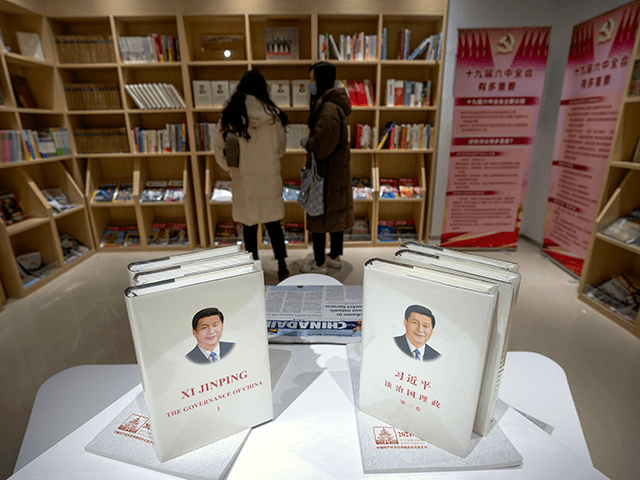Chinese state media on Wednesday applauded a book with “extracts of President Xi Jinping’s discourses on respecting and protecting human rights.”
Xi, an unelected dictator-for-life, is the world’s worst human rights violator by a considerable margin, having marched millions of ethnic minorities into concentration camps, brought slave labor back into the world on a massive scale, and brutally suppressed political freedom in all of Beijing’s tightly-held possessions.
Of course, Xi’s obedient “netizens” and regime propagandists do not see things that way. Officially forbidden under pain of severe punishment to discuss Xi’s atrocities, Chinese state organs such as China Daily saluted him as a visionary who is rewriting the definition of “human rights” according to Communist ideology.
This led to the grotesque spectacle of Xi winning applause for “human rights progress,” while the outraged objections of everyone outside the Chinese Communist Party were dismissed as dishonest foreign attempts to interfere in China’s internal affairs:
“Only the people have the right to judge a country’s progress on human rights protection,” said Jiang Jianguo, deputy head of the Publicity Department of the Communist Party of China Central Committee.
By always putting people first, China has achieved long-term economic development and social stability over the years, and its people are satisfied with the achievements, Jiang said on Tuesday at a meeting where Chinese and foreign readers shared their views on the book.
“China’s human rights progress is due to the leadership of the CPC and the advantages of the socialist system with Chinese characteristics,” he said.
“But the United States and some other Western countries are obviously dissatisfied with China’s approach and even attempted to deny it and used the human rights issue as an excuse to interfere in China’s domestic issues,” he said.
Contrary to its headline billing, China Daily’s article did not offer much in the way of applause from ordinary Chinese citizens for Xi’s alleged human rights triumphs. Instead, the article was filled with Communist Party functionaries and academic stooges, who robotically repeated Xi’s dogma that Westerners who pester China about human rights abuses are hypocrites who want to slander and ostracize Beijing for their own selfish reasons.
The China Daily piece pushed another twist on “human rights” developed by the Chinese Communist Party over the past two years: China’s alleged “success” at containing the Wuhan coronavirus proves it has more respect for genuine human rights than Western nations with larger numbers of coronavirus cases.
China lies constantly about how many coronavirus cases it has, and aggressively attacks all investigations into the source of the pandemic, to create that illusion of authoritarian “superiority.” The rest of the world is getting a queasy hint of how extravagant Beijing’s lies have been as it watches a magical coronavirus tidal wave that supposedly came out of nowhere rip across China, shutting down entire cities despite supposedly killing no one and making only a handful of people sick.
The arguments offered by Xi’s apologists would make almost every blood-splattered tyrant in history into a “human rights champion.” Leaders of Nazi Germany and Stalin’s Russia also claimed they were improving the health and livelihood of their preferred citizens by imposing order and getting rid of undesirables.
Buried in China Daily’s raves about Xi’s deep thoughts on human rights was the core concept powering Beijing’s engine of global hegemony in the 21st Century: a promise to support and enrich even the most monstrous regimes on Earth by dismissing human rights as a local concern, to be defined as each dictatorship sees fit.
A Nigerian recruited to work for Chinese state media was tapped to stress the point that China believes “human rights” are subjective cultural and national concepts, not absolute truths:
Gregory W. Adedigba from Nigeria, a researcher at the CGTN Think Tank, said that the book provides a solid framework for approaching human rights issues for anyone intending to understand why developing countries tend to be dismissive of charges of human rights abuses frequently leveled against them.
“China’s critics, and indeed, those of many developing countries would benefit from reading this book because it presents the case for respecting the unique cultural, historical and economic realities of every nation in their pursuit of human rights,” he said.
Xi’s attempt to redefine human rights arrives just a few weeks after the Chinese Communist Party published a white paper redefining “democracy” to mean “enlightened despotism.”
The paper actually asserted that true democracy is “centered on governance rather than elections” – in other words, it has nothing to do with people actually voting or possessing inalienable sovereign rights.
Instead, China claimed “whole-process democracy” exists when “ordinary people enjoy the dividends of peace and development and live peaceful and happy lives,” a state that can only exist under the firm hand of wise rulers who do not have to worry about dimwitted voters throwing temper tantrums and bouncing them out of office.
China is supporting this global gaslighting campaign with plenty of “sharp power,” using its economic leverage to silence both domestic and foreign critics. That is why certain Western media outlets are suddenly describing Xi’s human rights abuses as “alleged,” even though his concentration camps can be seen from orbit, and Western companies are helpfully deleting negative reviews of Xi’s books.
The Chinese Communist Party is very serious about winning the battle to redefine human rights and democracy. It is not clear how serious Western political, corporate, or academic leaders are about fighting back.

COMMENTS
Please let us know if you're having issues with commenting.